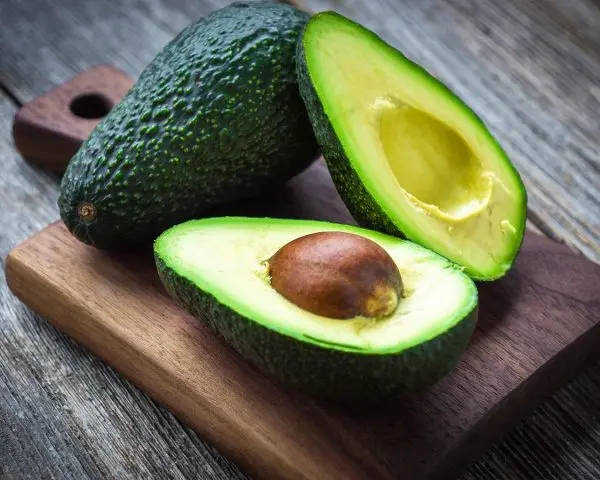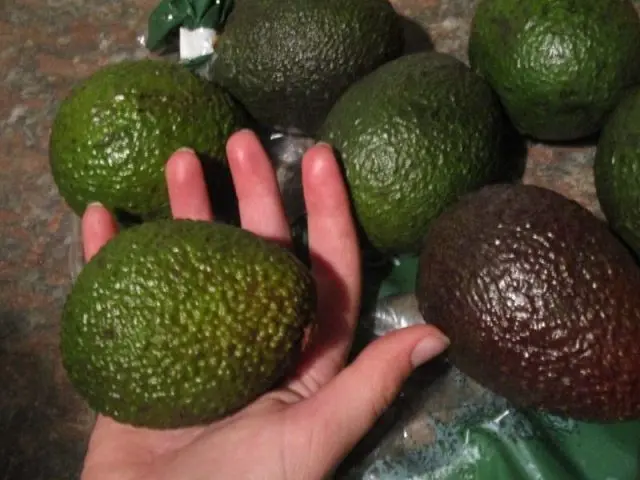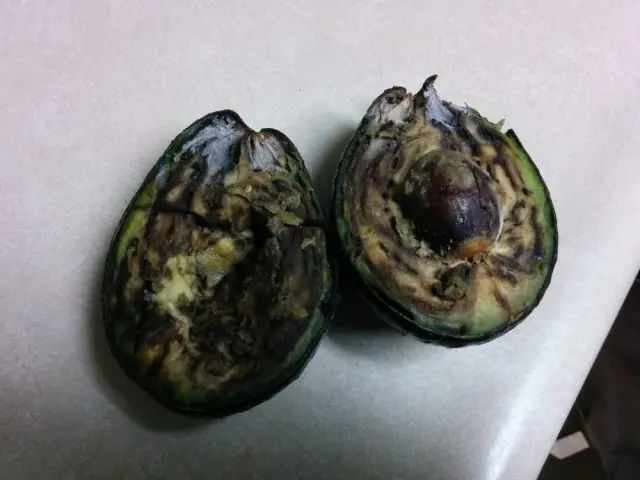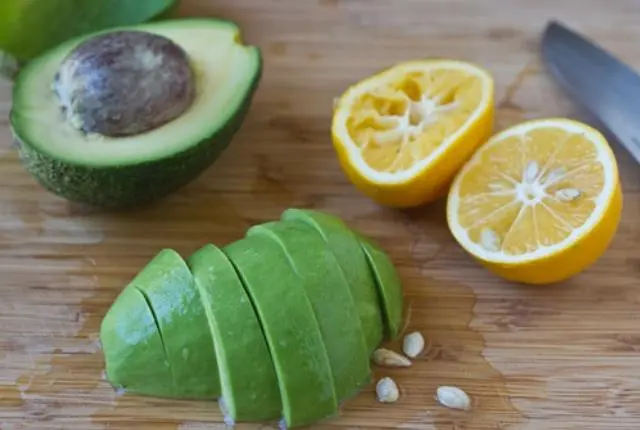Contents
Avocados are grown in areas with tropical and subtropical climates. After harvesting, the fruits do not immediately fall on store shelves. During transportation, part of the crop deteriorates, so the owners often collect unripe fruits. Violation of storage or transportation conditions can lead to loss of taste and change in structure. Whether an avocado is black inside or not is a matter of concern for consumers who choose vegetables and fruits in supermarkets and retail outlets.

What are black dots inside an avocado
The appearance of black dots inside is associated with technical ripeness. Ripeness is determined by several criteria:
- the trace from light pressing quickly disappears, the shell takes its former shape;
- the area where the cutting was located becomes green, with brown patches;
- when pressing on the handle, the oil accumulated inside can seep out;
- when shaking inside, you can hear the tapping of the bone;
- the stone is easily separated from the pulp: you can get it with a spoon.
The appearance of the peel will not say anything about the ripeness or preservation of the pulp inside. Depending on the variety, the peel is green, brown and in between.

Determine whether an avocado can be eaten should be based on the color and structure of the pulp. If the pulp is covered with black dots inside, this may indicate a violation of the storage rules. The appearance of black dots is due to the fact that the fruit was first stored in a cold room, and then it gets into heat.
The answer to the question of whether it is possible to eat pulp with black dots inside also depends on how much blackness is spread over the surface. If the black spot is located far from the stone and the area covered by it is approximately 10% of the total, that is, such a fruit can be removed by first removing the black spots with a spoon. Small black dots are picked out with the sharp tip of a knife, and then pieces of pulp are used for their intended purpose. Such pieces will not become bitter or have another unpleasant aftertaste.
If a black spot completely surrounds the stone on both halves, and when removed it turns out that it is distributed at all levels inside the pulp, then such a fruit should not be eaten. In this case, there are several reasons for the appearance of black spots:
- a sharp change in climatic conditions during storage;
- long stay at low temperatures;
- violation of transportation methods;
- possible stay in water and subsequent drying.
A black spot is evidence of overripeness. With maximum distribution, it threatens the fetus with a loss of taste and useful properties. It is better not to eat such a fruit, since, most likely, it will be bitter, and, in addition, it will lose its beneficial properties.

Is it possible to eat a darkened avocado
Avocado has long been considered an exotic fruit, but recently its presence on supermarket shelves has become familiar. Despite this, consumers are not fully familiar with the features of this culture. Many are afraid of the ability of the fruit to darken after cutting. In fact, there is nothing wrong with this. The fact is that the pulp contains an increased amount of iron inside. When exposed to air, an oxidation reaction begins. This causes the cut halves to darken.
What you need so that the avocado does not darken
To protect the pulp from darkening for a while, it is sprinkled with lemon juice. This will delay the oxidation process.
Another way to help prevent browning is to generously brush the cut halves with olive oil. After that, unused parts are stored in an airtight container in the refrigerator.
Why is avocado bitter
Often, after a successful selection of the fruit, it turns out that it is bitter when consumed. If, in addition to bitterness, an avocado contains brown streaks inside, this means that the fruit is completely overripe. There will be no benefit from its use, and it cannot be eaten. In addition, the taste of dishes prepared with it will suffer.
The second reason for the appearance of bitterness can be the immaturity of the avocado: in this case, it will be light yellow inside, with a bitter taste.
The pulp begins to taste bitter even after heat treatment. Usually they start eating it raw so as not to expose it to high temperatures, which destroy the structure and contribute to the loss of useful properties.
Is it possible to eat avocado if it is bitter
Unripe or overripe fruit usually tastes differently. An overripe fruit compensates for the bitterness with oiliness and softness of the structure.
An unripe avocado inside will be bitter to such an extent that it will be simply impossible to get pleasure from eating it. Bitterness does not mean that the fruit loses its beneficial properties or becomes harmful: it is just a sign of the level of ripeness and a characteristic of taste.

What to do if the avocado is bitter
If the fruit is overripe, then it will definitely be bitter. You can mask this taste with additional ingredients. It all depends on the skill of the cook or hostess.
If the avocado is bitter due to insufficient ripeness, then you can leave it for a few days to lose bitterness through ripening. To do this, you can use one of several methods.
- Place the pieces in a container, sprinkling liberally with lemon juice. After 3 – 4 days after storage, the fruit will no longer be bitter, it can be eaten.
- Uncut fruit should be left to ripen. To do this, it is wrapped in food paper and removed for several days where it is dark and dry.
Conclusion
There is an avocado, black inside, or not – they decide, depending on the reasons for the appearance of black spots. Small black spots on the surface of a fresh fruit will not cause harm. The spreading black spot, which is a precursor to the process of putrefaction and evidence of spoilage, is a signal that such a fruit should not be eaten. In addition, you should know that unripe avocados are bitter and tough, so the best option would be to leave such a fruit to ripen.









